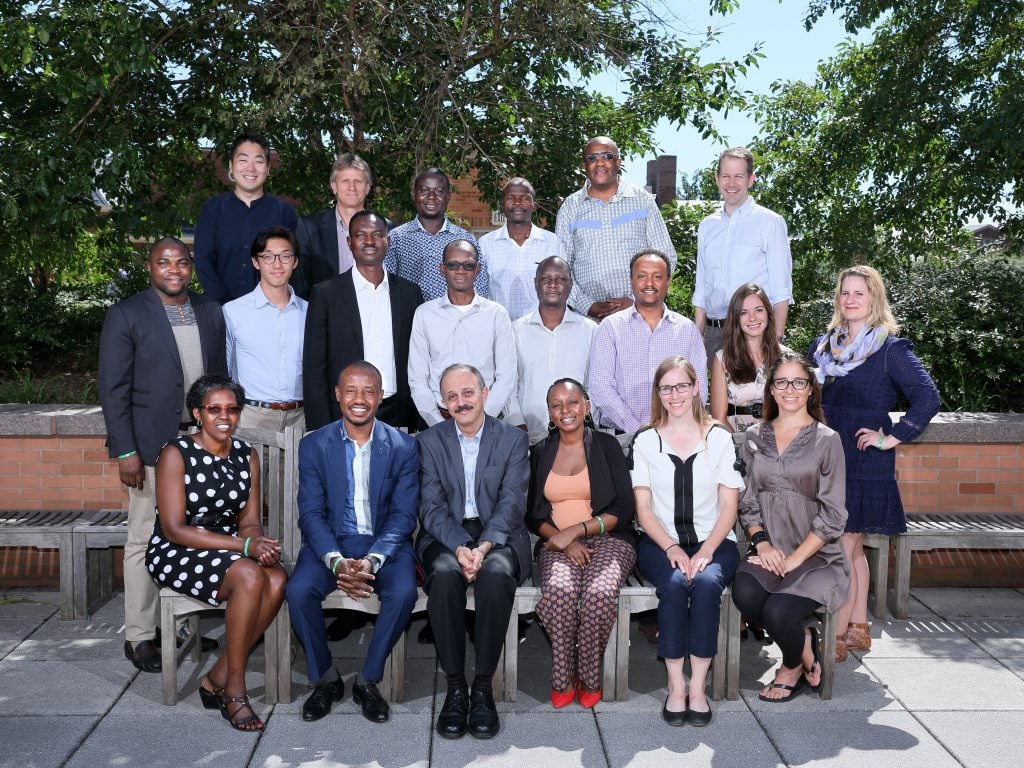
BOTSWANA
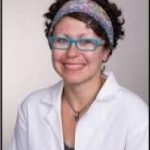 Alida Gertz, MD, MPH
Alida Gertz, MD, MPH
U.S. Fellow
Dr. Gertz will spend her fellowship year at Botswana Harvard Partnership in Gaborone under the mentorship of Shahin Lockman, MD, MSc and Chelsea Morroni, MPH, MPhil, PhD, MBChB. Her research will focus on optimizing pregnancy planning and prevention in the context of HIV.Dr. Gertz is currently spending two years living and working in Botswana as a global health fellow through the University of Washington (Afya Bora 2017-2018), and Harvard (Fogarty 2018-2019).She received her Medical Degree and a Master’s in Public Health from Case Western Re-serve University in 2010, and is currently working towards a Masters in Epidemiology through the London School of Hygiene and Tropical Medicine (2019), and a Diploma in Tropical Medicine & Hygiene through Médecins Sans Frontières (2019). She trained in internal medicine at Johns Hopkins (2013) and family medicine at the University of Pennsylvania (2015), and is board certified in Family Medicine (2015).
 Katrin Sadigh, MD
Katrin Sadigh, MD
U.S. Fellow
Dr. Sadigh will spend her fellowship year at Botswana Harvard Partnership (BHP) in Gabarone under the mentorship of Scott Dryden-Peterson, MD and Shahin Lockman, MD. Her research will focus on HIV and Anthracycline-Induced Cardiotoxicity in Women with Breast Cancer. Dr. Sadigh completed residency in internal medicine/HIV track at Yale New Haven Hospital in 2013. She is a clinical research fellow in Infectious Disease at the Partners program in Boston, MA. Her interest in HIV arose during the twenty-seven months she spent in a small village in Kenya as a Peace Corps volunteer. Dr. Sadigh’s main research pursuit involves the dynamic intersection between HIV and oncologic disease. She hopes to invest this next year in Botswana exploring the impact of HIV on overall survival in women with breast cancer. Future career aspirations include involvement in global health policy and refugee/ humanitarian disaster relief.
ETHIOPIA
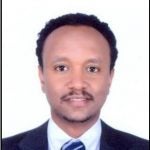 Amare Tadesse, MD, PhD, MPH
Amare Tadesse, MD, PhD, MPH
LMIC Fellow
Dr. Tadesse will spend his fellowship year at Addis Continental Institute of Public Health in Addis Ababa under the mentorship of Wafaie W. Fawzi, MD, DrPH and Yemane Berhane, MD, MPH, PhD. His research will focus on anemia among women of reproductive age and children in rural Ethiopia: associations with socio-economic determinants and food consumption. Dr. Tadesse is highly dedicated to promoting evidence-based inputs to improve the nutrition service delivery and maternal and child health and nutrition. His publications attest to success as a researcher and his future potential in research. Dr. Tadesse completed his medical education (MD) at Addis Ababa University, Ethiopia, in 2005, a master’s in public health (MPH) at the University of Gondar, Ethiopia, in 2009 and doctoral studies (PhD) in international child health and nutrition at Uppsala University, Sweden, in 2018. Dr. Tadesse teaches public health nutrition and research methods courses for graduate public health students and has been supervising the thesis research works of more than sixty MPH students. He has received faculty awards for his dedication and service from ACIPH.
KENYA
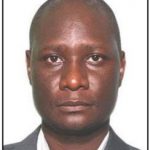 Samuel Anyona, PhD, MSc
Samuel Anyona, PhD, MSc
LMIC Fellow
Dr. Anyona will spend his fellowship year at the Center for Global Health Research (CGHR) in Kisumu under the mentorship of Douglas J. Perkins, PhD and Collins Ouma, MSc, PhD. His research will focus on Ubiquitin-Proteasome System (UPS) Gene Expression Profiles in Kenyan Children Presenting with P. falciparum Severe Malaria Anemia. Dr. Anyona received his doctorate degree in Medical Biochemistry from Kenyatta University, Nairobi, Kenya and post-doctoral training in global infectious diseases from the University of New Mexico. The HBNU Fogarty Global Health Training Program offers an excellent opportunity to join a mentored training paradigm that will transition Dr. Anyona towards a career as an independent scientist in infectious diseases with a focus on UPS, as well as an expanding his skills set and giving him the opportunity to work with world-class scientists.
 Martina Laidemitt, PhD
Martina Laidemitt, PhD
U.S. Fellow
Dr. Laidemitt will spend her fellowship year at the Kenya Research Medical Institute in Nairobi under the mentorship of Eric S. Loker, PhD. Her research will focus on the development of new tools to assess and understand the coming impact of environmental change on the vector snails of human schistosomiasis. Dr. Laidemitt received her PhD in biology in 2018. Her career goals are to further pursue research of neglected tropical diseases.Dr. Laidemitt is particularly interested in gaining a better understanding of the intersection between human disease transmission and biodiversity and how climate change will influence disease transmission. Dr. Laidemitt’s personal influences are her PhD advisor, Dr. Eric S. Loker who has supported her throughout her PhD and Dr. Sara Brant who was instrumental in the development of her PhD career.
 Tessa Lecuyer, DVM, PhD
Tessa Lecuyer, DVM, PhD
U.S. Fellow
Dr. LeCuyer will spend her fellowship year at the Centre for Global Health Research (CGHR) in Kisumu under the mentorship of Douglas J. Perkins, PhD and Collins Ouma, PhD, MSc. Her research will focus on determining environmental point-sources of bacteremia in human populations in a malaria holoendemic region of Kenya. Dr. LeCuyer is completing a combined clinical veterinary microbiology residency and PhD program at Washington State University. Her PhD research focused on the population structure and antimicrobial resistance of E. coli that causes urinary tract infections in dogs, with an emphasis on comparisons to urinary tract infections in women, as some of the same strains of antimicrobial resistant E. coli cause UTI in both people and dogs.Her interest in global health was solidified while working at the Botswana-Harvard AIDS Institute Partnership in Gaborone, Botswana as a Fulbright-Fogarty Public Health Fellow from 2011- 2012 when she was in veterinary school at Washington State University. Her
interests are in infectious disease diagnostics, veterinary diseases of public health importance, and antimicrobial resistance. In her free time, she enjoys horseback riding, being outdoors, and cooking.
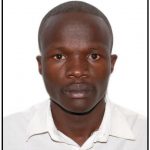 Elly Munde, PhD, MSc
Elly Munde, PhD, MSc
LMIC Fellow
Dr. Munde will spend his fellowship year at Kenya Medical Research Institute Centre for Global Health Research in Kisumu City under the mentorship of Douglas J. Perkins, PhD and Collins Ouma, PhD, MSc. His research will focus on the role of microRNA (mir)-186 and hypoxia inducible factor (HIF)-1A in conditioning P. falciparum-induced severe malarial anemia in Kenyan children. Dr. Munde completed his PhD (Human Genetics, Maseno University) in May 2018 on a Global Infectious Diseases training grant. He also holds a Bachelor and Master of Science degrees in Biomedical Sciences from Maseno University. Over the last four years during his PhD studies, Dr. Munde was able to identify genetic variations that condition susceptibility to pediatric severe malaria anemia and these have been published and presented at major international scientific meetings.
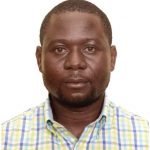 Evans Raballah, PhD, MSc
Evans Raballah, PhD, MSc
LMIC Fellow
Dr. Raballah will spend his fellowship year at The Centre for Global Health Research in Kisumu
City under the mentorship of Douglas J. Perkins, PhD and Collins Ouma, PhD, MSc. His research will focus on the role of complement C3 genetic variation in conditioning susceptibility to severe malarial anemia in Kenyan children.
His career goal is to become an established world class scientist in the immunogenetics of severe malarial anemia (SMA). Dr. Raballah received a Master of Science degree and a PhD in Immunology. He has published 13 manuscripts in his field of study and several are under preparation. In addition, he has previously received a travel award to present scientific work at the annual meeting of American Society of Tropical Medicine and Hygiene (ASTMH) in 2009 in Washington, DC. Most recently, Dr. Raballah was the recipient of a travel award to present scientific findings at the 7th Multilateral Initiative in Malaria (MIM) in April 2018, in Dakar, Senegal. His collaborative research activities at Siaya County Referral Hospital (SCRH) have positively impacted the community by tremendously reducing childhood mortality due to SMA by roughly 20%.
MALI
 Brehima Diakite, PhD, MD
Brehima Diakite, PhD, MD
LMIC Fellow
Dr. Diakite will spend his fellowship year at University of Sciences, Techniques and Technologies of Bamako (USTTB; University of Bamako) in Bamako under the mentorship of Seydou Doumbia, MD, PhD and Lifang Hou, MD, MSc, PhD. His research will focus on the genetics and epigenetics aspects of breast cancer. Dr. Diakite graduated in Medicine from the University of Bamako in 2008, and University Diploma Course (UD) in medical genetics from the University of Versailles in 2009. Then he obtained his PhD in Genetic and Molecular Pathology from Hassan II in 2015. Dr. Diakite is Faculty at the University of Bamako and currently holds the position of Assistant Professor of Genetic and Molecular Biology. His long-term goal is to become an independent clinical-scientist and leader in basic research of cancers focused on molecular epidemiology, epigenetic and pharmacogenetic aspects of breast cancer.
NIGERIA
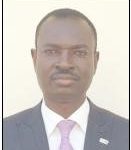 Isaac Abah, MSc, MPH
Isaac Abah, MSc, MPH
LMIC Scholar
Mr. Abah will spend his fellowship year at the University of Jos in Jos under the mentorship of Phyllis J. Kanki, DVM and Oche Ochai Agbaji, MBBS. His research will focus on the effect of cytochrome P450 2B6 (CYP2B6) single nucleotide polymorphism on the safety and effectiveness of efavirenz in HIV-1 infected Nigerians. Mr. Abah is a PhD student of the University of Jos in the Department of Clinical Pharmacy and Pharmacy Practice. Additionally, he works as an Assistant Director of Pharmaceutical Services and the Head of Pharmacy of a PEPFAR supported HIV treatment program at Jos University Teaching Hospital. He obtained a master’s degree in Pharmacology in 2007 from the University of Jos. In 2017 he completed a second master’s degree in Public Health at the University of The Western Cape, South Africa, graduating with a merit. Mr. Abah has over ten years’ cognate experience in the management of HIV patients, specifically monitoring of treatment response, adverse drug reactions and management of drug therapy problems. His PhD research interest is in the identification of single nucleotide polymorphisms (SNPs) that affect antiretroviral drugs pharmacokinetics, efficacy, and toxicity.
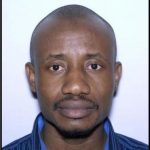 Saheed Lawal, PhD, MSc
Saheed Lawal, PhD, MSc
LMIC Fellow
Dr. Lawal will spend his fellowship year at the University of Ibadan, University College Hospital in Ibadan under the mentorship of David C. Henderson, MD and Adesola Ogunniyi, MBChB. His research will focus on exploring community engagement approaches for mental health care delivery in Nigeria: a qualitative study. Dr. Lawal is a faculty member in the Sociology Department of Olabisi Onabanjo University, Ago-Iwoye, Nigeria. Dr. Lawal obtained a PhD in Global health in 2015. Prior to his doctoral training, Dr. Lawal obtained a BSc and MSc in Sociology from the University of Ibadan. He specialized in demography and population studies for his master’s degree. Dr. Lawal was the recipient of the International Doctorate in Global Health Scholarship Award from Trinity College in Dublin, Ireland funded by Irish Aid and Higher Education Authority in Ireland. Dr. Lawal is interested in public health and primary care, bioethics, health policy and management, health education, HIV/AIDS cancer research and mental health.
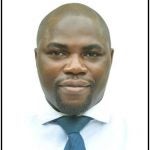 Kehinde Okunade, MBBS
Kehinde Okunade, MBBS
LMIC Fellow
Dr. Okunade will spend his fellowship year at College of Medicine University of Lagos (CMUL) in Lagos under the mentorship of Phyllis J. Kanki, DVM, DSc and Sulaimon A. Akanmu, MBBS, MWCP, FMCPath. His research will focus on randomized, double blind, placebo-controlled trial of selenium supplementations among HIV-infected pregnant women in Lagos, Nigeria: effects on pregnancy. Dr. Okunade is a junior faculty and clinician in the gynecologic oncology unit of the Department of Obstetrics and Gynecology of the University of Lagos College of Medicine and the Lagos University Teaching Hospital in Nigeria. He received his medical undergraduate training at the University of Lagos College of Medicine after which he completed his postgraduate fellowship programs of the National Postgraduate Medical College of Nigeria (NPMCN) and West African College of Surgeons (WACS) in 2013. Dr. Okunade has won various research/training funding opportunities among which include Oladele Akinla seed grant for junior faculty in Obstetrics and Gynecology in Lagos University Teaching Hospital (CMUL/LUTH), Building Research and Innovation in Nigeria’s Science (BRAINS)/Fogarty mentored research training grant and a sponsored visiting scholarship to Northwestern University, in Chicago, Illinois.
SOUTH AFRICA
 Kristina Korte, PhD
Kristina Korte, PhD
U.S. Fellow
Dr. Korte will spend her fellowship year at the University of Cape Town in Cape Town under the mentorship of Karestan Koenen, PhD and Soraya Seedat MBChB, MMed (Psych), PhD. Her research will focus on identifying cognitive and neurobiological risk factors associated with anxiety and traumatic stress disorders, the development of evidence-based preventative interventions and treatments for these disorders, and creating novel strategies to enhance treatment-seeking behaviors. Dr. Korte received her PhD in Clinical Psychology from Florida State University and completed her pre doctoral internship in the Charleston Consortium Clinical Psychology Internship Training Program at the Medical University of South Carolina. Dr. Korte was selected for a NIMH T32 postdoctoral fellowship in global mental health through Massachusetts General Hospital and Harvard Medical School. Dr. Korte has received several awards for her research including a pre doctoral National Service Research Award (F31) from NIMH for her work on the development of a transdiagnostic preventative intervention for subclinical anxiety. Dr. Korte has over 30 peer-reviewed articles and book chapters and presents her research at national and international conferences.
TANZANIA
 Ester Mzilangwe, MD,MMed
Ester Mzilangwe, MD,MMed
LMIC Fellow
Dr. Mzilangwe will spend her fellowship year at Muhimbili University of Health and Allied Sciences (MUHAS) in in Dar es Salaam under the mentorship of Sylvia Kaaya, MD, PhD and Mary Smith Fawzi, ScD. Her research will focus on the magnitude of mental health problems, barriers and facilitators for access to mental health services among pregnant and parenting adolescents in Tanzania. Dr. Mzilangwe received her medical degree and master’s degree in medicine with a specialization in Psychiatry from Muhimbili University of Health and Allied Science. She worked in the National Hospital, Tanzania and later joined Muhimbili University of Health and Allied Science as a faculty member in the Department of Psychiatry and Mental Health, and is now the current head of the department. She has contributed in the country efforts to prevent and respond to violence against women and children by conducting research that informs practices and develops various mechanisms to strengthen response services to victims of violence.
ZAMBIA
 Jason Park
Jason Park
U.S. Scholar
Mr. Park will spend his fellowship year at Zambia Center for Applied Health Research and Development (ZCAHRD) in Lusaka under the mentorship of Davidson Hamer, MD and Lawrence Mwananyanda, MD, MPH. His research will focus on improving primary care level labor and delivery service infection control. Mr. Park is a fourth year MD candidate at Boston University School of Medicine. He received his BS in biomedical engineering at Johns Hopkins University in 2015, where he began his involvement in global health, developing a mobile tocodynamometer for use in resource limited settings. Mr. Park hopes to pursue residency in internal medicine and continue research in disease prevention in primary healthcare settings.
